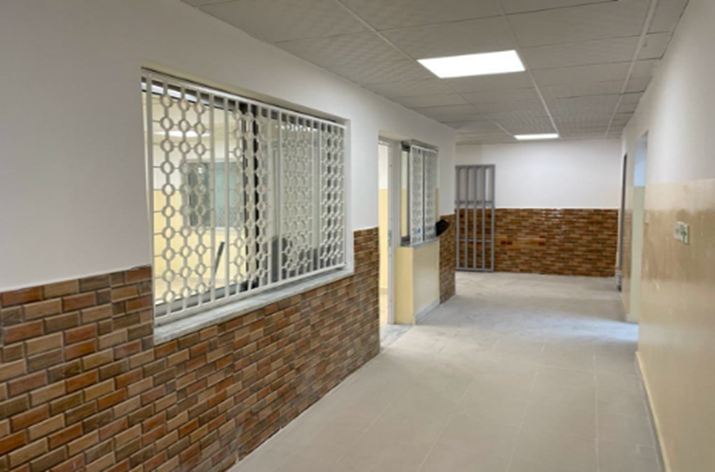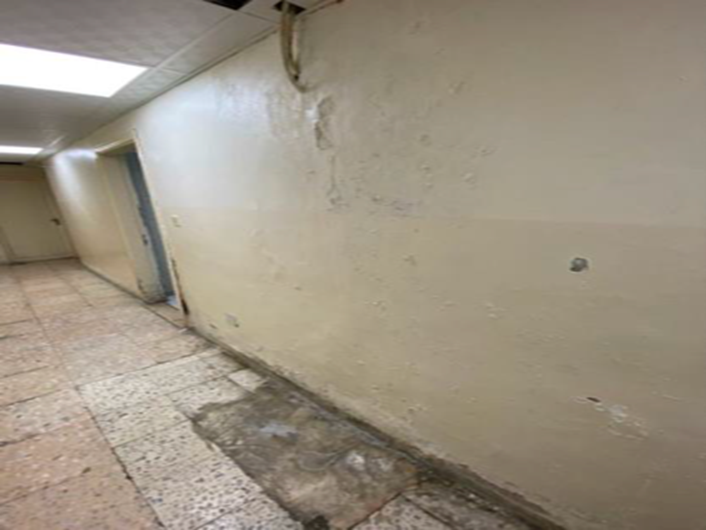Upgrading the care environment and safeguarding human rights through enhancing the efficiency of the National Center for Mental Health in Jordan

Photo caption: The National Center for Mental Health within Jordan's Ministry of Health has been renovated to improve its infrastructure, with the aim of creating a more therapeutic environment while upholding human rights.
Photo credit: WHO Jordan.
Enhancing the quality of care at Jordan’s National Center for Mental Health
Jordan’s National Center for Mental Health (NCMH) is tasked with delivering the full range of mental health services. Until recently, though, the 205-bed facility – which sits under the Ministry of Health – was not set up to provide holistic care in line with human rights considerations. Main challenges included the centre’s ageing infrastructure and the deteriorating condition of its facilities. The design of the centre, with its open spaces, also made it hard to ensure patient privacy. NCMH also suffered because of its model of care, workforce mix, shortage of human resources and limited prospects for capacity-building.
To resolve these issues, WHO Jordan provided technical and financial support to NCMH from September 2021 to January 2022 to upgrade its facilities, reorganize the service delivery model and enhance staff capacities from to create a more therapeutic environment for patients while upholding human rights. These activities were carried out in line with the National Mental Health and Substance Use Action Plan 2022–2026, which WHO Jordan helped to update in 2022. The Action Plan advocates for community-based mental health services, delivered in an integrated way across the health system, to both improve quality of care¬ and protect human rights.

Photo caption: Before WHO’s intervention, Jordan’s National Center for Mental Health (NCMH) was in relatively poor condition.
Photo credit: WHO Jordan.
How did Jordan, with the support of WHO, achieve this?
WHO support to upgrade the NCMH care environment and safeguard human rights included:
high-level meetings with Ministry of Health leaders to advocate for deinstitutionalization; restructuring of governance for mental health within the Ministry; and mobilizing action for reform;
organizing study visits to the WHO Collaborating Centre for Research and Training in Mental Health, Italy, to orient senior management and staff to support deinstitutionalization and the development of integrated and comprehensive community mental health services;
development of an evidence-based road map to speed up reorientation of mental health services and facilitate reform;
conducting training workshops for health workers to develop their essential knowledge of the concepts of disability, handicap, stigma, discrimination and recovery; of psychosocial rehabilitation; and of strategies to address the needs of people with severe psychosocial disability;
financial support to enable the renovation of NCMH, focusing on 3 chronic care units, which were transformed into subacute units, to support shorter hospital stays and speed up patients’ reintegration into the community.
Dr Mekhled Al-Balawneh, Deputy Director of NCMH
About 75 patients are already benefiting from the markedly better equipped and improved care environment. This intervention by WHO was an important step towards supporting the deinstitutionalization process, safeguarding basic human rights and improving quality of care. Patient outcomes have improved, prompting NCMH to ask WHO Jordan to extend its technical and logistics support to the facility. WHO has pledged ongoing collaboration with NCMH, committing to elevate the standards of mental health facilities across Jordan.
Dr Jamela Al-Raiby, WHO Representative in Jordan
WHO’s Key Contributions
Organized study visits to WHO Collaborating Centre for Research and Training in Mental Health in Italy.
Organized technical missions to advocate for deinstitutionalization; restructuring of governance for mental health within the Ministry; and mobilizing action for reform;
Developed a comprehensive evidence-based roadmap to accelerate re-orienting of mental health services.
Provided technical support in the development of the new National Action Plan2022-26 and building up the capacity of multidisciplinary teams at the NCMH teams
Provided financial support to facilitate the necessary renovations and imp
Oman: The impact of the COVID-19 pandemic on mental health

General public
The COVID-19 pandemic has had a profound impact on the mental health of individuals worldwide, including the young population. In Oman, where young people were confined to their homes and residences, mental health issues escalated over time. Numerous studies and research efforts were conducted to understand the specific effects of COVID-19 on young people’s mental health. Here are some key findings from these studies.
Prevalence and predictors of depression, anxiety and stress among youth at the time of COVID-19: an online cross-sectional multicounty study (2020)
This study reported that the overall prevalence of depression, anxiety and stress among youth was 57%, 40.5% and 38.1%, respectively, with no significant variations between countries.
Significant predictors of stress, anxiety and depression included being female, having contact with a friend or family member with mental illness, undergoing a 14-day quarantine and using the internet.
Predictors of psychological distress among the public in Oman amid coronavirus disease 2019 pandemic: a cross-sectional analytical study
This study revealed that around 30% of women and girls experienced psychological distress. Independent predictors of psychological distress included being female, facing financial instability, receiving treatment for mental illness and engaging in self-medication to cope with stress.
The impact of COVID-19 on the private higher education system and students in Oman (2021)
This study highlighted that student satisfaction with online education did not exceed 50%. It also noted that exams were replaced by extra coursework or assessment based on existing coursework without prior announcement. Financial implications caused by the pandemic led to concerns among 40% of students regarding the non-payment of tuition fees.
Sleep quality among healthcare workers during the COVID-19 pandemic
This study found that 28.9% of respondents experienced moderate to severe stress, while 53% reported depression and 40% reported sleep disturbances.
The mental health of female physicians and nurses in Oman during the COVID-19 pandemic
This study revealed that doctors and nurses involved in the care of COVID-19 patients experienced higher levels of stress compared to those not directly involved. Approximately 45.3% of participants scored 50% or less on the well-being scale.
The mental health of healthcare workers in Oman during the COVID-19 pandemic
This study indicated that stress levels were high among women and young healthcare workers. Overall, mental health and well-being were poorer among women and young healthcare workers compared to their male and more experienced counterparts. The study emphasized the need to examine the psychological and social well-being of healthcare workers in other Arab countries.
Factors associated with mental health outcomes across healthcare settings in Oman during COVID-19: frontline versus non-frontline healthcare workers
In this study, a significant number of healthcare workers experienced mental health issues. Among the participants, 32.3% reported symptoms of depression, 34.1% experienced anxiety, 23.8% faced stress and 18.5% suffered from insomnia. The study highlighted a notable distinction in the impact on mental well-being between frontline and non-frontline healthcare workers. Frontline workers were 1.5 times more likely to report anxiety, stress and insomnia compared to their non-frontline counterparts. However, there were no significant differences in the prevalence of depression between the two groups.
Service users and their family members
During the pandemic, several measures were implemented to ensure the provision of essential healthcare services and support.
Outpatient department services were reduced in all health facilities, with a focus on managing emergencies and unstable conditions.
Most polyclinics established hotlines for patients to seek assistance and make inquiries.
Patients were advised to contact healthcare facilities via WhatsApp or phone to ensure the availability of medication.
Monthly medications and new follow-up appointments were provided to patients.
Service providers in health and social care
To support the healthcare providers during the pandemic, several polyclinics established hotlines for service providers to reach out if needed.
Challenges
Oman faced challenges in addressing mental health issues during the pandemic.
Patients exhibited reluctance to attend clinics, leading to a significant increase in mental health relapses, substance abuse and related behaviours.
Concerns about contracting the virus contributed to decreased attendance at chronic disease clinics, including psychiatric clinics.
The pandemic resulted in poor medication adherence and sudden lifestyle changes, further exacerbating mental health symptom relapses, substance abuse and related aggressive and violent behaviours.
Delivering mental health and psychosocial support services (MHPSS) and ensuring continuity
In response to the ongoing COVID-19 crisis, innovative solutions were implemented to ensure the delivery of mental health and psychosocial support (MHPSS) services in Oman.
Adjustments were made to mental health services as part of the COVID-19 response, including reducing outpatient department services in most health facilities.
Services were re-arranged to accommodate emergency cases and provide close follow-up for stability.
Routine cases were provided with a longer regular supply of psychiatric medications.
Psychiatric clinics shared their contact details with the community for consultations in case of need.
Hotline numbers were established for healthcare providers to seek support and arrange clinic visits for additional assistance.
Phone consultations were provided for healthcare providers managing patients in institutional quarantine, as well as for patients in institutional quarantine.
In terms of psychological support, several initiatives were undertaken.
Educational sessions on COVID-19 and its impact on well-being were conducted by various governorates for the general public and healthcare providers, utilizing programmes like Zoom.
Collaborative efforts involving governorates, private clinics and community psychological teams led to the development of hotline services and the creation of awareness messages and short videos in Arabic, English, Urdu and French languages, targeted at the public and healthcare providers.
The "Pause. Breathe. Choose" campaign was launched in Oman to promote mental health and well-being among all groups, with an initial focus on healthcare providers.
Instructions and recommendations for physical and mental well-being during institutional quarantine/isolation were provided.
A psychological team called Youth Psychology developed a website with chat facilities, Q&A pages and a list of psychological support counselling centers. This initiative, called "Tatamaan" aimed to provide accessible mental health support during the COVID-19 pandemic.
Lessons learnt
The experiences during the COVID-19 pandemic in Oman highlighted several valuable lessons.
There is a need to develop guidelines that ensure the continuity of care during periods of unrest, crisis and emergencies.
Reaching out to the public through various media channels to provide essential guidance on coping during crises is of utmost importance.
Rapid assessments of psychiatric clinics should be conducted to evaluate the impact of reorienting services on patients.
The positive response to hotline services should be considered for wider implementation.
Utilizing virtual technology for educational purposes, training and raising awareness about coping strategies during and after crises can be highly effective.
References
Ministry of Health Oman (Twitter)
Sleep quality among healthcare workers during the COVID-19 pandemic
The impact of COVID-19 on the private higher education system and students in Oman 2021
The mental health of female physicians and nurses in Oman during the COVID-19 pandemic
The mental health of healthcare workers in Oman during the COVID-19 pandemic
Islamic Republic of Iran: The impact of the COVID-19 pandemic on mental health

Context
The impact of the COVID-19 pandemic on the mental health of the general population in the Islamic Republic of Iran has been profound. This narrative focuses on the experiences of individuals who have lost loved ones to COVID-19. Grief, a natural response to loss, becomes even more challenging during these trying times. Acceptance of the loss is the ultimate stage in the cycle of grief. However, the pandemic has presented unique challenges that affect individuals' ability to cope with their loss. Adhering to the official safety regulations issued by the Ministry of Health, survivors have encountered various situations, including:
Reactions following the death of COVID-19 patients, which put family members in a difficult position due to the fear of virus transmission and the attached stigma.
Grieving and fear of virus transmission during corpse handling, leading to limitations in the burial process.
Prohibition of traditional burial ceremonies, funerals and social gatherings to remember the departed loved ones, in compliance with social distancing regulations.
Family members who were in close contact with COVID-19 patients in their final days had to undergo a mandatory quarantine period of 14 days to prevent the transmission of the virus. This resulted in the grieving family members going through a difficult period of loss and grief with minimal support from relatives and acquaintances.
Challenges
Several challenges were encountered in providing support to the grieving individuals.
Some survivors did not feel the need for counselling sessions, particularly if their lost loved ones were in the elderly age group. They believed that death at that age is natural, although they were unable to perform traditional mourning rituals.
Cultural beliefs in some families led to the notion that enduring the loss and experiencing grief is a natural process that can be managed individually, regardless of its chronic or complicated nature. They did not believe in the concept of pathological grief and considered individuals suffering from grief as loyal, receiving social rewards. Hence, they did not perceive the need for counselling for themselves or their family members.
Fear of virus transmission deterred some survivors from attending counselling sessions at health centers. Although they recognized the need for psychological support, they believed that visiting health centers would put them at risk of contracting COVID-19. This prompted the provision of online counselling sessions, while some families requested group sessions.
Delivering mental health and psychosocial support services (MHPSS) and ensuring continuity
Innovative solutions
To address the prevention of complicated grief among survivors, two interventions were implemented.
Guidelines were developed to assist hospital staff in delivering bad news to survivors while considering emotional, cultural and religious aspects. Additional guidelines were created for divisions responsible for handling bodies and ensuring safe burials, taking into account both safety protocols and cultural sensitivities. Practical arrangements and funeral guidance were provided to individuals and families, considering the restrictions imposed by social distancing regulations. Temporary home quarantine measures were also addressed for those left behind.
Structured psychological counselling services were established for survivors. The objective was to facilitate the grief process and enhance coping with loss. A training package for grief counselling, comprising five counselling sessions, was developed by the Department for Mental Health in collaboration with the Iranian Psychiatric Association and the Iran University of Medical Sciences. Clinical psychologists from the primary health care system, working in health centers, delivered the counselling sessions. Workflows were designed to ensure safety and online training sessions were conducted to enhance the capacity of the health staff. Trained psychologists called individuals and invited them for face-to-face counselling sessions at health centers, adhering to the Ministry of Health's safety standards.
Referral and training of service providers
If at any stage an individual was diagnosed with a mental disorder or deemed to be in a psychiatric emergency, such as being at risk of suicide, they were referred to general practitioners for initial assessment and, if necessary, to a psychiatrist for further evaluation and treatment.
To ensure the provision of effective mental health services, service providers underwent comprehensive training. This training was conducted via two video-conference sessions, each lasting approximately three hours. The trainers consisted of five university-affiliated psychiatrists and clinical psychologists who were actively involved in the development of guidelines and training materials.
The trainees included mental health staff from all 63 medical universities across the country, covering all 31 provinces. Some universities opted to have multiple trainees, particularly those located in larger catchment areas. As a result, certain universities had up to 10 psychologists trained through these video conference sessions. This extensive training aimed to equip service providers with the necessary skills and knowledge to effectively support individuals who experienced mental health challenges during the COVID-19 pandemic.
Lessons learnt
The implementation of psychological counselling sessions yielded valuable insights.
Many survivors lacked social support to express their sorrow and grief, making counselling sessions their only opportunity to ventilate their emotions and find relief. They eagerly participated in the sessions and acknowledged their positive impact.
The counselling sessions proved instrumental in detecting psychiatric disorders and identifying cases of domestic violence and substance use disorders.
Some families required additional services, such as social support or financial assistance, while others sought help to meet their basic needs.
References
Complicated grief: what to expect after the coronavirus pandemic
Grief counseling and grief therapy, fourth edition: a handbook for the mental health practitioner
Grief during the COVID-19 pandemic: considerations for palliative care providers
Prolonged grief and depression after unnatural loss: latent class analyses and cognitive correlates
Treatment of complicated grief
Treatment of individuals with prolonged and complicated grief and traumatic bereavement








